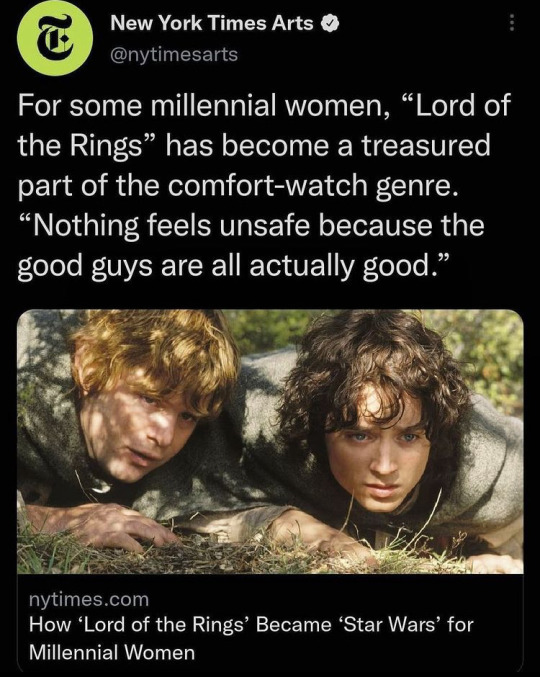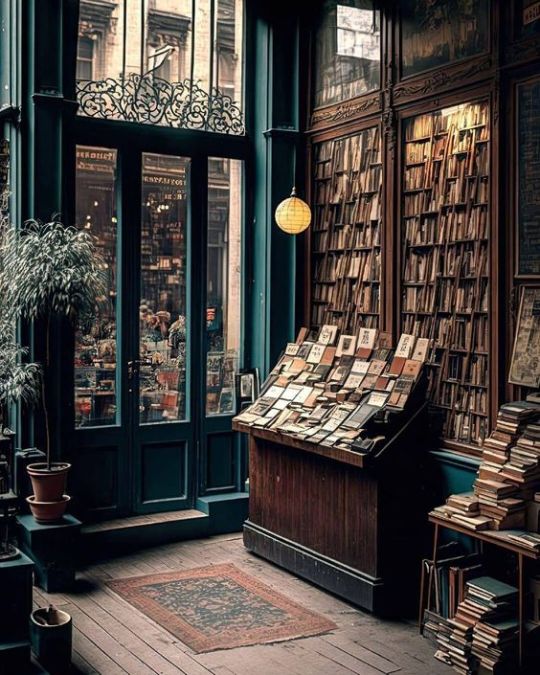Text

Books I Read in 2024
#25 - Gifts, by Ursula K. Le Guin
Rating: 1/5 stars
A rare miss for me from Le Guin. I don't require all my fiction to be fast-paced or action-packed, but this was glacially slow, on top of having an odd structure where most of the book was essentially an extended flashback, on top of having all characters who weren't the protagonist be functionally one-dimensional.
I kept going, hoping it would get better because the reason I was reading this at all was that I found the second book in the series, Voices, at a secondhand shop and thought "Le Guin that I haven't read yet? Sold!" without realizing it was a second book at all. But the start to this series was so disappointing I'm going to re-donate Voices unread.
I never found much of anything to care about; the story is yet another coming-of-age for a teenage boy with unusual powers, and Orrec is no Ged.
0 notes
Text
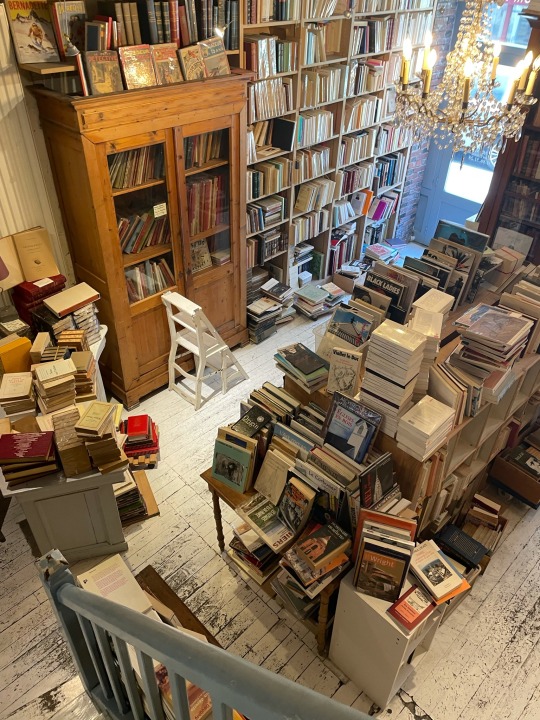
The calm feeling of wandering through an old and empty bookshop ♡
23K notes
·
View notes
Text


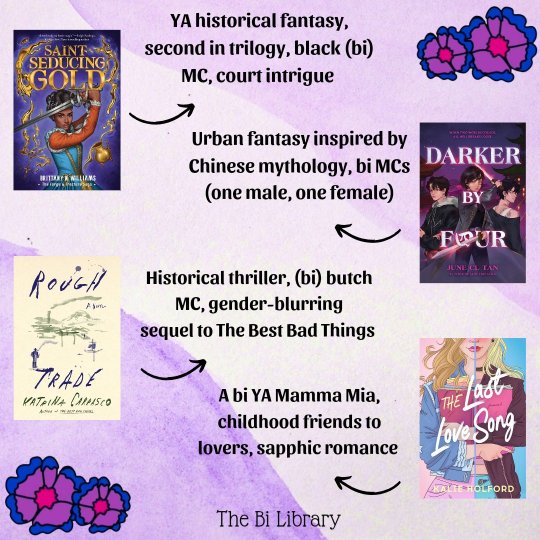
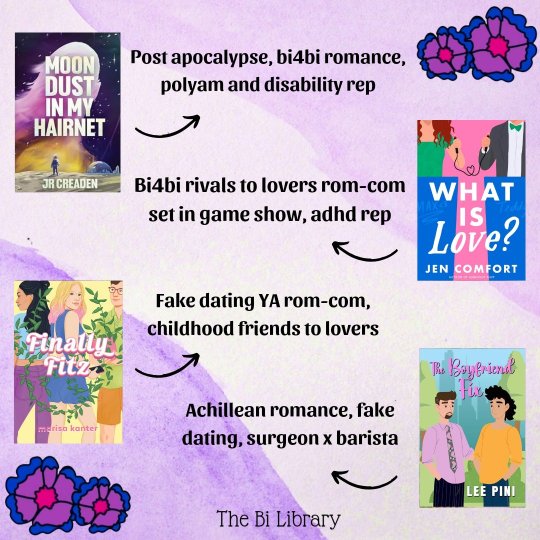
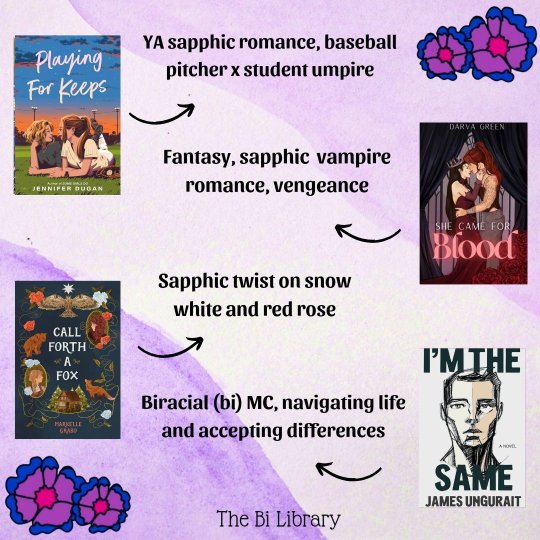
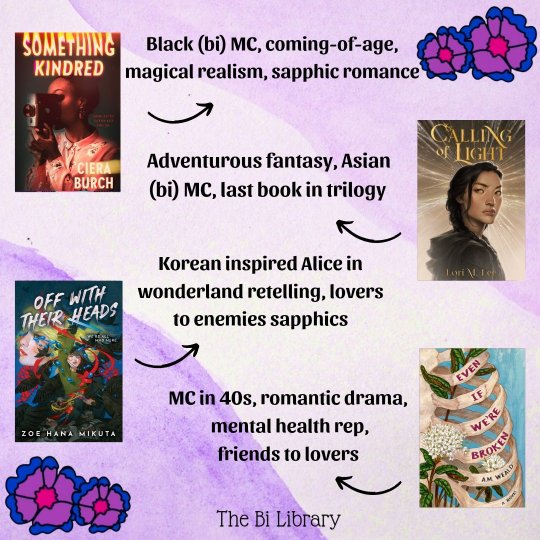
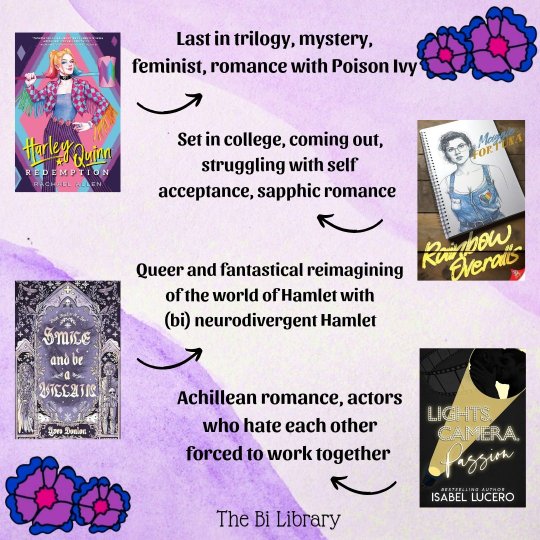
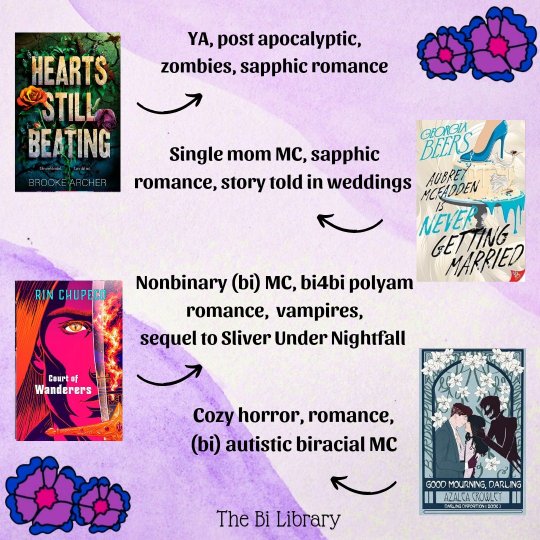

Here are bisexual books out in April!
Books listed:
In Universes by Emet North
Dear Bi Men: A Black Man's Perspective on Power, Consent, Breaking Down Binaries, and Combating Erasure by J.R. Yussuf
Truly, Madly, Deeply by Alexandria Bellefleur
Of Blood and Aether (Harbingers, #1) by Harper Hawthorne
Saint-Seducing Gold (The Forge & Fracture Saga #2) by Brittany N. Williams
Darker by Four (Darker by Four, #1) by June C.L. Tan
Rough Trade by Katrina Carrasco
The Last Love Song by Kalie Holford
Moon Dust in My Hairnet by J.R. Creaden
What Is Love? by Jen Comfort
Finally Fitz by Marisa Kanter
The Boyfriend Fix by Lee Pini
Playing for Keeps by Jennifer Dugan
She Came for Blood (Dreamers & Demons: Sapphic Monsters Book 3) by Darva Green
Call Forth a Fox by Markelle Grabo
I'm The Same by James Ungurait
Something Kindred by Ciera Burch
Calling of Light (Shamanborn, #3) by Lori M. Lee
Off With Their Heads by Zoe Hana Mikuta
Even If We're Broken by A.M. Weald
Harley Quinn: Redemption (DC Icons Series Book 3) by Rachael Allen
Rainbow Overalls by Maggie Fortuna
Smile and Be a Villain by Yves Donlon
Lights, Camera, Passion by Isabel Lucero
Hearts Still Beating by Brooke Archer
Aubrey McFadden Is Never Getting Married by Georgia Beers
Court of Wanderers (Silver Under Nightfall, #2) by Rin Chupeco
Good Mourning, Darling (Darling Disposition, #1) by Azalea Crowley
All the Hype (Oak Haven Romance) by S. Bolanos
The Devil to Pay by Katie Daysh
Every Time You Hear That Song by Jenna Voris
You can find these books in this list on goodreads
149 notes
·
View notes
Text

Books I Read in 2024
#24 - How to Suppress Women's Writing, by Joanna Russ
Rating: 5/5 stars
The prologue asks the reader not to view the book as a mirror, but it was impossible for me not to, as a woman, as a writer, and as a student of "literature" both formally (I did take courses on it in college) and informally (how many book reviews am I up to now? Last time I counted it was over 800, so by now I might be close to or even over a thousand...)
I looked into that mirror and saw not only the ways I have personally been suppressed, but the ways I have participated in my own suppression and suppressed others.
I've never wanted to write "literature" or be regarded as a "great" writer; when I was scribbling (to borrow from Alcott) away on notebook paper in high school teachers would joke about The Great American Novel, but chasing that laurel was never my goal. I wrote about what interested me, which has ranged from weird absurdist short stories when I was younger, to fantasy and sci-fi, and finally, what I actually published was romance (though some of it in a post-apocalyptic setting, so that's also blending in some sff/horror elements.) I never felt actively pushed out from the "center," as Russ puts it, of the literary canon; I never wanted to be there.
But that was on a conscious level. Subconsciously, I probably knew I couldn't get there even if I wanted to and tried.
So I'm a genre-fiction author. (I'll still call myself that even if it's been over three years since I published and there's no new book on the horizon--literature authors can take decades-long breaks and still come back with another book and they'll have been an author the whole time, so I'll keep my title and my pride.) I'm quite comfortable and at home in the genre suburbs, away from the bright city lights of the literary canon, but I live there knowing full well that no matter how well genre fiction sells, no matter how romance is the biggest single genre in the industry in terms of both published works and total sale, it will still remain the suburbs. There's no real hope in me that genre fiction will ever get the recognition it deserves from the literary elite--but that's how I'm still participating in the system, because if I didn't still, on some level, think literature was "better" then it wouldn't matter, would it?
I live in the genre suburbs based on what I was reading growing up--my mom was an avid reader and it was almost entirely mystery and science fiction, not just the "classic" science fiction that was largely male in her day (Bradbury, Heinlein, Asimov, etc.) but also, with the popularity of the "new" Star Trek series in the late 80s when I was a kid, whole shelves full of Star Trek novels, which in her collection seemed to be roughly balanced in terms of male/female authorship. Almost all of the ones I loved best and reread a dozen or more times were written by women. (I love you, Diane Duane, I didn't even know you'd written non-Trek stuff until years later.)
My role models for writing were not entirely female--it's impossible to deny the impact Stephen King in particular has had on my work--but most of what I read in my late teens and early twenties as well was female-written fantasy, romance, and fantasy-romance. (I refuse to call it romantasy. Absolutely refuse.)
So I don't lack a tradition, one of the forms of dismissal Russ points out is used to isolate female writers as anomalies; their works may be exceptional in quality, but they are still exceptions to the "rule" of male dominance.
What I do lack is an awareness of how deeply I've internalized the male-driven standards of "literature" anyway and wield them as a cudgel in my book reviewing. Yes, I often disdain works of literary fiction knowingly for their hollow pretension and constant insistence that only male experience matters, only men deserve to have their stories told, and everything else is lesser than them. But I had not realized how firmly I had recentered what I believe "good" writing is in my own experiences and my own desires and still looked down on marginalized authors that wrote things too different, too experimental, too unfamiliar, and criticized them in much the same way any of the historical critics Russ quotes would be speaking of my work, were they around still to read it.
It was the section on poetry, I think, that really pushed the mirror in my face and made me cringe at my own actions. Once upon a time, a Tumblr poet made it big with her debut, and I read it a few years later, and I gave it a poor review, contending that no matter how heartfelt it was, it wasn't "poetry." I tried to keep the critique of her work about her work, and not about the obviously powerful emotions and pain that spurred it, and I hope I succeeded; but I definitely used the rubric of "poetry" that I had been taught my whole life as the lens to view her pieces, and they all fell short by that standard, no matter how genuine the emotion was.
I did the exact same thing to her that male critics have been doing to female poets the whole time; she wrote it, but it isn't poetry.
I don't think I would have the experience Russ writes of in her afterword, where she realizes she reads Their Eyes Were Watching God, thinks it's bad, but then realizes she's too far away from it (essentially) and does a bunch of educational reading to bring herself closer to it before she rereads, and hey whaddaya know, it's actually really good. If I reread that slim volume of short poems again...I'll be honest, I'm pretty sure I still wouldn't like it. But I would no longer say it's not poetry. "Growth only happens in the margins," as Russ said repeatedly. All of her observations about the way men dismiss women stand equally true (as she herself says) for any other majority/minority dynamic, and it's the marginalized authors who have the freedom to be different, to push the boundaries and experiment with style and form and content, simply because they are so far away from the calcified center mass of "true" literature that, by unspoken definition, can only be produced by older, white, middle-class or higher men.
2 notes
·
View notes
Text
What I Say: My favorite genre is alternative history
What People Hear: I like considering what would happen if the Civil War/WW2/Cold War ended differently
What I Mean:
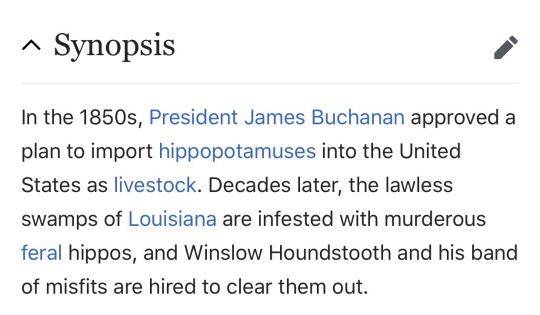
82K notes
·
View notes
Text
do me a solid and just reblog this saying what time it is where you are and what you’re thinking about in the tags.
#10:29 pm#drinking a beer while thinking about women in literature#because my current read is#how to suppress women's writing by joanna russ
534K notes
·
View notes
Text
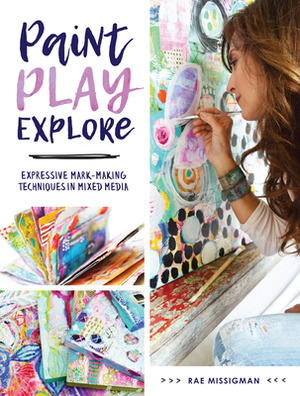
Books I Read in 2024
#23 - Paint, Play, Explore: Expressive Mark-Making Techniques in Mixed Media, by Rae Missigman
Rating: 3.5/5 stars
A bit of an odd duck, in my experience, in terms of books on art instruction. There are plenty of exercises encouraging the reader-artist to try new techniques, and constant encouragement to make notes about what was successful and what wasn't; which I find sensible but also somewhat at odds with the free-wheeling, anything-goes nature of the art style as presented.
Whether or not the look of the author's art is to your personal taste isn't the point (I find some of the example pieces pretty and others ugly, as it happens,) the point is the technique. I didn't experiment with every technique presented, because a great many of the exercises called for tools I didn't have (mostly the ones associated with printing, like brayers and printing plates) so I did what I could with the materials I do have. (I also skipped anything involving "organic" dyes like the raspberry juice and the Easter-egg-dye tablets.)
Eventually these exercises lead to one final big project, a large-scale canvas that the author encourages the reader-artist to work on collaboratively with others, especially family members, especially non-"artists." I have not done that at this stage--this is a library book I need to return--but I'm both intrigued and put off by this final exercise, which has incredibly detailed instructions and calls for a whole host of improvised mark-making tools that I don't have and won't invest in.
My final thoughts are that this is a highly inspirational book for anyone looking to play with mixed media, but the exercises themselves intended to teach techniques and encourage experimentation are sometimes so proscriptive in their instruction that they often felt limiting when that's clearly not the intention. I also found it odd that the progression of exercises seemed random, without much in the way of a difficulty curve, and based on assumptions about how I paint that aren't true--I couldn't do the paint-chips exercise because I always clean my palette, I thought I was supposed to? And the earlier exercises suggested cleaning my brushes on scraps of fabric to create new media to incorporate, so I was, and thus also not making paint chips. I've started reserving a few wells of my palette to let paint dry on so I can get them soon, but a "helpful tip" box earlier on, like the one for the fabrics, would have been useful.
And that's indicative of my experience with nearly everything about the book--a mix of interesting and experimental and fun, but also full of assumptions based on how the author makes art that aren't universal.
Also, and this is such a tiny personal nitpick, but the lengths to which the text goes never to use the word "draw," I found a little ridiculous. Okay, I get it, this isn't drawing even when I'm using media often used for drawing like pens and pencils and crayons, but sometimes the instructions are clearly asking you to draw something, except some people think drawing is hard, so we're "making marks" instead. The introduction of the book goes into detail about the author's thought process in developing her mark-making philosophy, which is somehow simultaneously vague and deeply personal, so I can't relate to it, but I also don't want to criticize her for it; I just found it silly that the book won't use the word "draw" even in cases where it's the most relevant verb for what the instructions want you to do.
1 note
·
View note
Text
we absolutely did not appreciate Ursula Le Guin enough while she was around, y'all
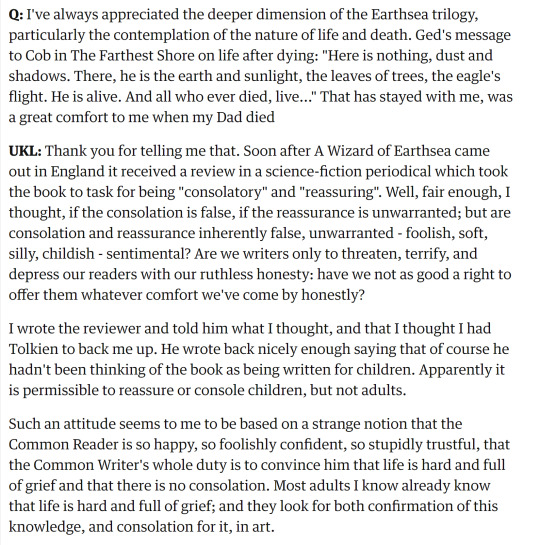
3K notes
·
View notes
Text
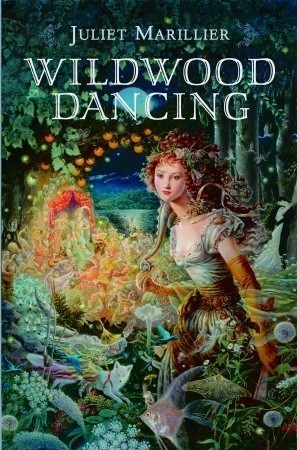
vote yes if you have finished the entire book.
vote no if you have not finished the entire book.
(faq · submit a book)
39 notes
·
View notes
Text
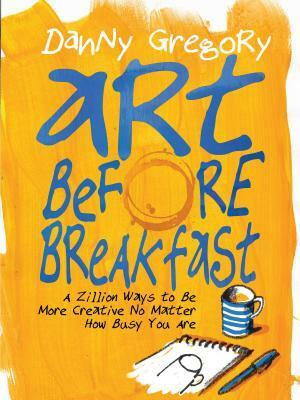
Books I Read in 2024
#22 - Art Before Breakfast: A Zillion Ways to Be More Creative No Matter How Busy You Are, by Danny Gregory
Rating: 3/5 stars
The ethos of this book speaks to me: it's possible to make time for anything (in this case, drawing) if you prioritize it and/or break it down into small chunks. The "before breakfast" part is encouraging the reader to put their drawing practice first, and in this case I mean "practice" as daily observance rather than action meant to gain or improve skill.
The idea being that gaining skill will come naturally if you just do the thing.
And I think for a lot of people a lot of the time, that's true, but there's very little practical instruction in this book, it's a week-long course of exercises to get started (which I am doing; I read the whole book in a day but this morning saw me on Day 4 of the first week of early-morning art-making) and then a bunch of inspirational exercises in no real order with no real difficulty curve. A lot of the ideas I like, and quite a few I don't--especially the one telling me to "borrow" someone else's child to draw, since I have none of my own...that's a little weird; and the one telling me to skip a meal and draw instead, or that I'll end up eating less if I'm drawing my meals frequently because they'll get cold. I'm not down with bringing food into a discussion about forming an art habit beyond "hey food is fun to draw," the author shouldn't be telling us not to eat.
Back on the positive side, there's also an explicit permission in the book to do art badly, to suck at it. Which is something that a lot of people need to hear.
But do I think this book has really found its way into the hands of the target audience? That audience feels narrow, because this isn't for Real Artists, it's self-help for "busy" people who want to make art but don't feel like they have time. I already make art frequently, so I don't really "need" this book, though as with many ADHD peeps I go through phases with my hobbies and will probably never devote myself fully to one type of art or craft forever. And it's not going to satisfy anyone looking to get more serious about drawing (or whatever type of "art" they end up doing for their 30 days, if they stick to it) because of the lack of practical instruction.
I grabbed it off a library display about art (with another, very different book I'll review soon) and said, "sure, why not, my art journal's been neglected recently" but since I already have a strong interest in art, I can't really judge how successful this book is at what it sets out to do--get a busy newbie started on an art journey. I don't think it's terrible (beyond those exercises I find questionable) but I'm not sure it's all that great, either.
0 notes
Text

Books I Read in 2024
#21 - Never Been Kissed, by Timoty Janovsky
Rating: 1/5 stars
What if To All the Boys I Loved Before got an m/m makeover? You get this book, and I'm on board with that idea, but it turned out that the premise stopped mattering only a few chapters in, because none of the other might-have-been boys matter to the story. (One is a current friend/roommate and the revelation is dealt with quickly, and the other two are entirely off-screen characters who never respond.)
So it's a rehashed setup for what's actually a summer fling romance, but also a bildungsroman, because the MC is a recent college graduate who needs to figure out what the heck to do with his life. That personal arc felt artificial, because most college grads aren't (or at least aren't hoping to) take one last poorly-paying summer job before finding a "real" job--the goal is get the real job right away!
Also the job itself seemed unnecessarily harsh; a "three strikes and you're out" policy isn't unreasonable, but one of the "strikes" the MC suffered was for getting accidentally stuck in a locked closet for a few minutes, and then the second is explicitly being punished for a mistake an underling made that he fixed. I've worked in some toxic hellholes in my day and this rubbed me the wrong way up one side and down the other, and is clearly supposed to be a source of plot tension but the plot really didn't need "will the MC lose his crappy summer job?" added to all the other nonsense, it never felt genuine because no, of course he's not going to get fired, he can't save the drive-in if he gets fired from it. The fact that the owner/manager is such a jerk boss made me less inclined to want the drive-in saved, he's not a particularly sympathetic figure, and if I'm not rooting for the hero to save the day in the non-romance plot, that takes a lot of wind out of my sails as a reader.
Also, the romance plot was bland. I never really felt invested in either lead character, and the demisexual revelation halfway through sucked out any sexual tension the relationship had (B+ for rep compared to some other demi romances I've read, C- for the pacing issues it caused.)
On top of not being impressed with either the main plot or the romance plot, I was actively annoyed by the MC's circle of friends, I'm long past the time when "a whole bunch of melodramatic queer people as a group" is good enough to take the place of actually developing minor characters. I finished this a few days ago and I've already forgotten their names and couldn't tell you anything about their personalities beyond a constantly high level of whining and interfering with the MC's life in ways he didn't always find welcome.
Now that I've written it all out, I'm struggling to find anything I actually enjoyed about this book, and I haven't even mentioned the sub-main-plot of reviving a lost queer movie premiere as the bid to "save" the drive-in, I'm not opposed in theory but most of the time it actually felt more important to the MC than the romance, when I thought I was getting a romance novel...
#booklr#book review#romance novels#lgbtq books#i know tumblr loves this author but i was not impressed
1 note
·
View note
Text

Books I Read in 2024
#20 - Obsidio, by Amie Kaufman and Jay Kristoff
Rating: 5/5 stars
An amazing end to an amazing trilogy. Seriously, when was the last time I read a trilogy in any genre where all three books were this good? Where the ending didn't disappoint?
Nothing about the fast-paced and unusual style changed throughout the series, so if you didn't enjoy the first book, then its sequels won't change your mind, but to anyone who has started the series but not yet finished it, finish it. The only reason I waited so long was because I had to get the book through interlibrary loan, and that took a while. (I knew enough about the format of the book to know my brain would hate trying to listen to this as audio or read it on my phone, I had to have a physical book that had nice big pages and that I could easily physically turn to read any text that wasn't upright.)
I won't say anything about the plot aside from one small detail I enjoyed: finding out who was transcribing the video footage all this time. I'd like to say "oh, I should have figured that out" but early on, there's no way to know, and the sort of sass and snark that finds its way into those transcriptions is broad enough to belong to several wisecracking characters. (Also it's alluded to that other characters tweaked a few scenes here and there, so while the bulk of it was done by one person, little bits of others' personalities are present, so yeah, I wasn't going to figure it out ahead of time.)
0 notes
Text
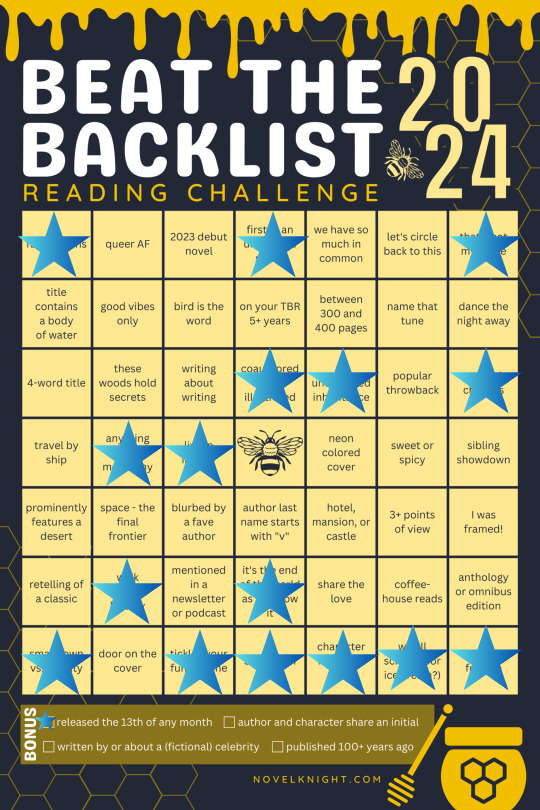
March additions, all at once because I wasn't diligent about tracking as I reviewed:
small town vs. big city: Hook, Line, and Sinker
STEM stan: Better Sex Through Mindfulness
walk through history: A Brightness Long Ago
live in infamy: Summer Knight
that's not my name: Blood Heir
released the 13th of any month (bonus): Magic Claims
2 notes
·
View notes
Text
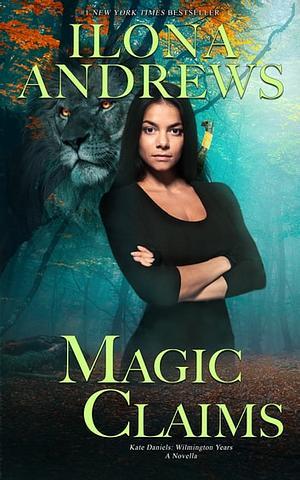
Books I Read in 2024
#19 - Magic Claims, by Ilona Andrews
Rating: 2/5 stars
Am I an avid IA fan who will keep reading books set in a single universe past the original (long) runtime of the planned series? Absolutely.
Is it disappointing to get a book that says to that original series "let's undo all of the character arcs and set the main characters back where they started, except married, and this time they mean to do it better?"
Ugggggggh.
I want to keep reading future books about Hugh and Julie, I liked the starting entries in their respective spin-off series. (We'll see if/when those book actually get written.) But this book makes me want to give up on the "main" series because hey, Kate's claiming land again and Curran's building a new Keep to house a new, better Pack. When walking away from those things was the culmination of their characters in order to focus on having a family. Now this series says "oops, we tried that, we were fooling ourselves" and hits the reset button.
Also, the pattern the Kate books have fallen into since Kate and Curran became a happy couple--some cute and cozy affection sprinkled through the action with one obligatory sex scene somewhere in the final act--felt really stale here, and the sex scene itself was one of the least inspired, most mechanical I've ever read, not just from this author (who generally does pretty well in this department!) but in any romance or romance-adjacent novel ever. Like, bottom five sex scenes of all time, for sure.
I didn't look at any other reviews but I see the overall rating is high, so I'm guessing I'm in the minority here, and that's fine, I certainly don't want anyone to hate the book on my behalf. But I don't like this direction to the story at all, which overshadowed the plot of the actual book, which was sort of interesting as weird magical shit goes.
0 notes
Text
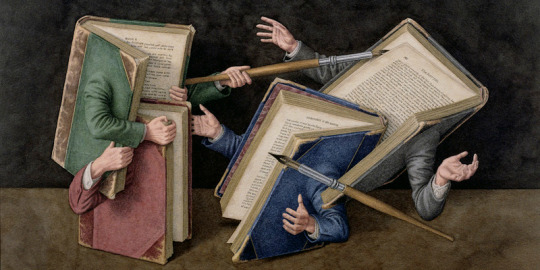
My books when it is time to choose my next read
12 notes
·
View notes
